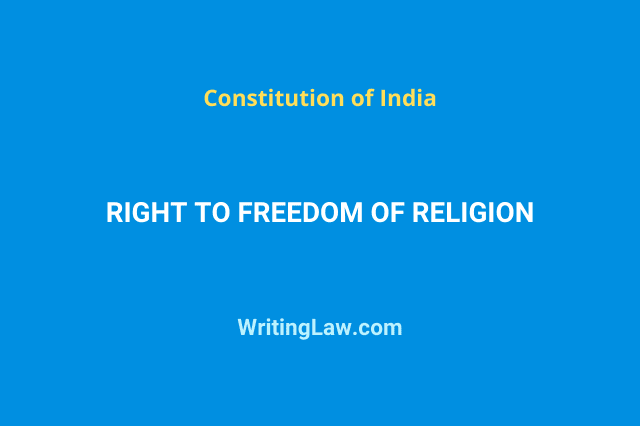
India is a secular country. Being secular, the Constitution of India guarantees every citizen the right to profess, practice and propagate any religion of their choice. Moreover, citizens also have the right to manage religious affairs guaranteed under Article 26 of the Indian Constitution.
The right to freedom of religion can be understood by Articles 25 to 28 of Part III of the Constitution.
In this law note, we explain the freedom of religion as per the Indian Constitution.
Article 25: Freedom of Conscience and Free Profession, Practice and Propagation of Religion
Article 25 of the Indian Constitution grants every person the right to freely profess, practise and propagate the religion of their choice. It also states that every person must be equally permitted the freedom of conscience. The right to practise religion is equally available to both men and women of all age groups professing the same religion.
Thus, Article 25(1) provides for two-fold freedom:
(a) freedom of conscience.
(b) freedom to profess, practise and propagate religion.
Restrictions to Freedom of Religion
(Religious Liberty Subject to Public Order, Morality and Health)
The exercise of rights given under Article 25(1) has been made conditional to public order, morality, health, and other provisions provided in Part III. It means that nothing can be done against public order, morality and health of the public in the name of religion. Also, the freedom to practice any religion must not affect the exercise of freedoms given under Part III of the Constitution.
Further, clause (2) of Article 25 states that the rights guaranteed under Article 25 should not affect the operation of any existing law. It also empowers the state to make any law relating to regulation and restriction of any economic, political, financial or other secular activity that is or may be related to religious practice. It also empowers the state to contribute to social welfare and reform and the establishment of public Hindu religious institutions for all the classes and sections of Hindus.
It is to be noted that the right to propagate any religion does not give the right to any person to ‘forcibly’ convert the religion of another person.
Furthermore, as per Explanation 1 of Article 25, Sikhs have the right to wear and carry Kirpans. However, they are entitled to keep not more than one sword without a license.
Case Law Related to Article 25
Bijoe Emmanuel vs State of Kerala, AIR 1984
Bijoe Emmanuel vs State of Kerala case is also known as the National Anthem Case. In this case, three children belonging to “Jehova’s Witnesses” of the Christian community were dismissed from the school for refusing to sing the Indian national anthem. However, they stood up respectfully when the national anthem was sung every morning at their school. They refused to sing the national anthem as it was against the tenets of their religious faith.
The High Court of Kerala held that it was their fundamental duty to sing the national anthem. And hence, the headmistress was within her right not to allow them to attend the class until they gave in writing that they would participate in the singing of the national anthem in the school.
The petitioner then moved to the Supreme Court. The Supreme Court reversed the decision and upheld that anyone cannot be forced to sing the national anthem if they have a genuine, conscientious and religious objection.
Article 26: Freedom to Manage Religious Affairs
Article 26 of the Indian Constitution provides the freedom to manage religious affairs. It states that every religious denomination of any section of it has the following rights:
(a) right to establish and maintain institutions for religious and charitable purposes.
(b) right to manage matters of religion.
(c) right to own and obtain movable and immovable property and regulate such property as per the law.
Further, the state cannot interfere in the exercise of these rights unless they are violative to public order, health or morality.
Article 27: Freedom From Taxes for Promotion of Any Particular Religion
Under Article 27 of the Indian Constitution, a person has a right not to be forced to pay any taxes that are intended to cover the costs of promoting or maintaining any particular religion or religious denomination. It is to be noted that this Article restricts the levying of tax and not of the fee.
Article 28: Prohibition of Religious Instruction in the State-Aided Institution
Article 28 of the Indian Constitution basically provides four types of educational institutions:
(a) institutions completely maintained by the state.
(b) institutions recognised by the state.
(c) institutions that are acquiring aid out of the state fund.
(d) institutions that are regulated by the state but are established under any trust or endowment.
Furthermore, it is elaborated that no religious instructions can be imparted in type (a) institution. In (b) and (c) type institutions, religious instructions may be imparted only with the consent of the individuals. And, in the (d) type institutions, there are no restrictions on religious institutions.
- Right to equality
- Right to freedom
- Right against exploitation
- Right to freedom of religion (You read above)
- Cultural and educational rights
- Right to constitutional remedies
- Understanding the Legislative Branch of the Indian Government - 6th May 2024
- Appointment, Oath, and Removal of Constitutional Posts in India - 28th April 2024
- Powers of Income Tax Authorities in India - 26th April 2024







